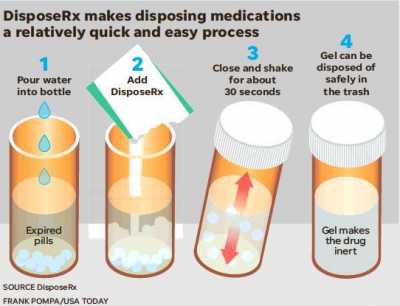Running a pharmacy may be both gratifying and difficult. The healthcare sector depends heavily on chemists. Because they provide the prescription medications, advice, and support that patients need to improve their results.
But these obligations also carry several serious concerns. The challenges of owning and operating a pharmacy are unique. From the possibility of drug mistakes to the physical risks of the job. This article will discuss several hazards that come with operating a pharmacy. Talk about how crucial pharmacy insurance is to effectively controlling these risks as well.
Editor's note: Don't delay seeking advice from your health care provider with prolonger over-the-counter remedies. Some conditions, including but limited to persistent cough, gastrointestinal symptoms, headache etc may be a symptom of a more serious condition and should be evaluated by your doctor or provider.
Have you ever thought about how convenient it would be if your local pharmacy was just a few clicks away? Well, with the rise of online pharmacies, that's exactly the reality for many people. These digital services have become a practical solution for managing a wide range of health conditions. Whether you need professional advice or simply want the convenience of ordering treatments from the comfort of your own home, an online pharmacy can be a reliable and efficient partner in maintaining your health.
Managing Minor Health Issues with Ease
We all deal with minor health complaints from time to time. Maybe its that cold you caught last week is still lingering. When these everyday issues arise, the last thing you want to do is wait in long queues at a pharmacy. Fortunately, online pharmacies are well-equipped to help with a wide range of over-the-counter products for common ailments. For instance, many offer treatments for sniffles, colds, and flu that can be delivered directly to your door. Pain relief options, decongestants, and throat lozenges can all be found online. Along with medications, you can also access advice about symptom management. Often, pharmacists are available for virtual consultations, offering practical advice on what you might need based on your symptoms. (more…)In today's fast-paced world, healthcare is moving toward more personalized and patient-centric approaches. This trend is evident in the increasing popularity of compounding pharmacies. These specialized pharmacies offer customized solutions tailored to individual patient's needs, making them an essential part of modern healthcare. While healthcare services are diverse and growing, the need for personalized medication is becoming more recognized. This article will explore the top benefits of custom compounding and why it's becoming a cornerstone of personalized healthcare.
Understanding Custom Compounding
Custom compounding refers to the creation of personalized medications by pharmacists to meet the unique needs of individual patients. Unlike traditional pharmacies that dispense mass-produced medications, compounding pharmacies prepare medications from scratch. This allows for a high degree of customization, ensuring that each medication is tailored specifically to the patient's requirements. The practice of compounding dates back to the origins of pharmacy, but it has gained renewed importance in modern healthcare as patients and providers seek more targeted treatment options. (more…)
In today's fast-paced society, advancements in technology, changes in patient demographics, and shifts in healthcare policies are continuously reshaping the role of pharmacists. To stay relevant and effective in your profession, it's essential to stay ahead of the curve and adapt to these emerging trends.
 As a future pharmacist, you are positioned at the forefront of patient care, entrusted with ensuring the safe and effective use of medications. To fulfill this role effectively, you must remain informed and adaptable to the latest advancements in pharmacy practice.
Before delving into these trends, let’s first look at some relevant statistics. With the industry witnessing constant evolution, the demand for pharmacists continues to soar even more. In the first three quarters of 2023, there were about 60,882 job postings for pharmacists. This marked an increase of 17.9% from 2022, indicating a significant push in demand for these professionals.
The data from AACP’s Pharmacy Demand Report indicates that the time is opportune to enter the industry and gain a competitive edge. However, you must be aware of the prevalent trends to reap the benefits. Utilizing free MPJE practice questions can also help you prepare effectively for your licensure exam. In this blog, we'll explore a few essential trends that every aspiring pharmacist should know.
(more…)
As a future pharmacist, you are positioned at the forefront of patient care, entrusted with ensuring the safe and effective use of medications. To fulfill this role effectively, you must remain informed and adaptable to the latest advancements in pharmacy practice.
Before delving into these trends, let’s first look at some relevant statistics. With the industry witnessing constant evolution, the demand for pharmacists continues to soar even more. In the first three quarters of 2023, there were about 60,882 job postings for pharmacists. This marked an increase of 17.9% from 2022, indicating a significant push in demand for these professionals.
The data from AACP’s Pharmacy Demand Report indicates that the time is opportune to enter the industry and gain a competitive edge. However, you must be aware of the prevalent trends to reap the benefits. Utilizing free MPJE practice questions can also help you prepare effectively for your licensure exam. In this blog, we'll explore a few essential trends that every aspiring pharmacist should know.
(more…)
 As a future pharmacist, you are positioned at the forefront of patient care, entrusted with ensuring the safe and effective use of medications. To fulfill this role effectively, you must remain informed and adaptable to the latest advancements in pharmacy practice.
Before delving into these trends, let’s first look at some relevant statistics. With the industry witnessing constant evolution, the demand for pharmacists continues to soar even more. In the first three quarters of 2023, there were about 60,882 job postings for pharmacists. This marked an increase of 17.9% from 2022, indicating a significant push in demand for these professionals.
The data from AACP’s Pharmacy Demand Report indicates that the time is opportune to enter the industry and gain a competitive edge. However, you must be aware of the prevalent trends to reap the benefits. Utilizing free MPJE practice questions can also help you prepare effectively for your licensure exam. In this blog, we'll explore a few essential trends that every aspiring pharmacist should know.
(more…)
As a future pharmacist, you are positioned at the forefront of patient care, entrusted with ensuring the safe and effective use of medications. To fulfill this role effectively, you must remain informed and adaptable to the latest advancements in pharmacy practice.
Before delving into these trends, let’s first look at some relevant statistics. With the industry witnessing constant evolution, the demand for pharmacists continues to soar even more. In the first three quarters of 2023, there were about 60,882 job postings for pharmacists. This marked an increase of 17.9% from 2022, indicating a significant push in demand for these professionals.
The data from AACP’s Pharmacy Demand Report indicates that the time is opportune to enter the industry and gain a competitive edge. However, you must be aware of the prevalent trends to reap the benefits. Utilizing free MPJE practice questions can also help you prepare effectively for your licensure exam. In this blog, we'll explore a few essential trends that every aspiring pharmacist should know.
(more…)
Author Interviews, Opiods / 26.06.2019
Walgreens DisposeRx Program Will Provide Free Drug Disposal System at Pharmacies
MedicalResearch.com Interview with:
John Holaday, PhD
Chairman and CEO of DisposeRx
Dr. Holaday discusses the recentannouncement that Walgreen's has added DisposeRx to its safe medication drop off kiosks.
MedicalResearch.com: What is the background for this study? How big is the problem of unused risky medications leftover after the need or indication period has passed?
Response: Keeping leftover medications in the home significantly increases the risk of accidental poisonings as well as diversion, which can lead to addiction, overdoses and death. According to the Centers for Disease Control & Prevention (CDC), accidental medicine poisonings send nearly 60,000 children under 5 years old to emergency rooms annually. And, a study by the National Institute on Drug Abuse found that the first opioid used by 70% of individuals with heroin-use disorder was a prescription pain medication, often remaining in their medicine cabinet well after the pain subsided and then a remaining temptation for abuse.
This is a pervasive problem across the country. In an independent survey DisposeRx sponsored, it was found that 4 out of 10 Americans are keeping leftover prescriptions—including opioids – in their medicine cabinets. Other results of the survey include: 62% of respondents who said they stored medications in case a condition returns; and 37% said they save prescription drugs in case a friend or family member needs them.
 These consumers need to be educated about all the potential harm resulting from saving leftover medications. Leading pharmacy chains such as Walgreens are committed, as responsible corporate citizens, to making DisposeRx available upon request for their customers and to educate them about its use in getting rid of leftover drugs before they cause harm. Walgreens sees value in adding DisposeRx at-home solution to its comprehensive medication management and opioid stewardship programs as an additional method to reduce risks and exposure.
(more…)
These consumers need to be educated about all the potential harm resulting from saving leftover medications. Leading pharmacy chains such as Walgreens are committed, as responsible corporate citizens, to making DisposeRx available upon request for their customers and to educate them about its use in getting rid of leftover drugs before they cause harm. Walgreens sees value in adding DisposeRx at-home solution to its comprehensive medication management and opioid stewardship programs as an additional method to reduce risks and exposure.
(more…)
 These consumers need to be educated about all the potential harm resulting from saving leftover medications. Leading pharmacy chains such as Walgreens are committed, as responsible corporate citizens, to making DisposeRx available upon request for their customers and to educate them about its use in getting rid of leftover drugs before they cause harm. Walgreens sees value in adding DisposeRx at-home solution to its comprehensive medication management and opioid stewardship programs as an additional method to reduce risks and exposure.
(more…)
These consumers need to be educated about all the potential harm resulting from saving leftover medications. Leading pharmacy chains such as Walgreens are committed, as responsible corporate citizens, to making DisposeRx available upon request for their customers and to educate them about its use in getting rid of leftover drugs before they cause harm. Walgreens sees value in adding DisposeRx at-home solution to its comprehensive medication management and opioid stewardship programs as an additional method to reduce risks and exposure.
(more…)
Addiction, Author Interviews, Opiods / 15.11.2018
More Pharmacies Willing To Dispense Naloxone Without Prescription
MedicalResearch.com Interview with:
Kirk Evoy, PharmD, BCACP, BC-ADM, CTTS
 Clinical Assistant Professor
College of Pharmacy, The University of Texas at Austin
Adjoint Assistant Professor
School of Medicine, University of Texas Health Science Center at San Antonio
Ambulatory Care Pharmacist
Southeast Clinic, University Health System
UT Health Science Center at San Antonio
Pharmacotherapy Education and Research Center
San Antonio, TX 78229
MedicalResearch.com: What is the background for this study? What are the main findings?
Response: Previous studies in Indiana and New York City, and the similar study in California published alongside ours identified that, despite the fact that laws designed to increase naloxone access had been in place for 2-3 years, patients were still not able to obtain naloxone without first seeing a doctor in many pharmacies.
Our study showed contrasting results to the previous studies, with a much higher proportion of pharmacies stocking naloxone and stating their willingness to dispense without an outside prescription. Among the 2,317 Texas chain community pharmacies we contacted, 83.7% correctly informed our interviewers that they could obtain naloxone without having to get a prescription from their doctor before coming to the pharmacy. We also found that 76.4% of the pharmacies had at least one type of naloxone currently in stock. (more…)
Clinical Assistant Professor
College of Pharmacy, The University of Texas at Austin
Adjoint Assistant Professor
School of Medicine, University of Texas Health Science Center at San Antonio
Ambulatory Care Pharmacist
Southeast Clinic, University Health System
UT Health Science Center at San Antonio
Pharmacotherapy Education and Research Center
San Antonio, TX 78229
MedicalResearch.com: What is the background for this study? What are the main findings?
Response: Previous studies in Indiana and New York City, and the similar study in California published alongside ours identified that, despite the fact that laws designed to increase naloxone access had been in place for 2-3 years, patients were still not able to obtain naloxone without first seeing a doctor in many pharmacies.
Our study showed contrasting results to the previous studies, with a much higher proportion of pharmacies stocking naloxone and stating their willingness to dispense without an outside prescription. Among the 2,317 Texas chain community pharmacies we contacted, 83.7% correctly informed our interviewers that they could obtain naloxone without having to get a prescription from their doctor before coming to the pharmacy. We also found that 76.4% of the pharmacies had at least one type of naloxone currently in stock. (more…)
 Clinical Assistant Professor
College of Pharmacy, The University of Texas at Austin
Adjoint Assistant Professor
School of Medicine, University of Texas Health Science Center at San Antonio
Ambulatory Care Pharmacist
Southeast Clinic, University Health System
UT Health Science Center at San Antonio
Pharmacotherapy Education and Research Center
San Antonio, TX 78229
MedicalResearch.com: What is the background for this study? What are the main findings?
Response: Previous studies in Indiana and New York City, and the similar study in California published alongside ours identified that, despite the fact that laws designed to increase naloxone access had been in place for 2-3 years, patients were still not able to obtain naloxone without first seeing a doctor in many pharmacies.
Our study showed contrasting results to the previous studies, with a much higher proportion of pharmacies stocking naloxone and stating their willingness to dispense without an outside prescription. Among the 2,317 Texas chain community pharmacies we contacted, 83.7% correctly informed our interviewers that they could obtain naloxone without having to get a prescription from their doctor before coming to the pharmacy. We also found that 76.4% of the pharmacies had at least one type of naloxone currently in stock. (more…)
Clinical Assistant Professor
College of Pharmacy, The University of Texas at Austin
Adjoint Assistant Professor
School of Medicine, University of Texas Health Science Center at San Antonio
Ambulatory Care Pharmacist
Southeast Clinic, University Health System
UT Health Science Center at San Antonio
Pharmacotherapy Education and Research Center
San Antonio, TX 78229
MedicalResearch.com: What is the background for this study? What are the main findings?
Response: Previous studies in Indiana and New York City, and the similar study in California published alongside ours identified that, despite the fact that laws designed to increase naloxone access had been in place for 2-3 years, patients were still not able to obtain naloxone without first seeing a doctor in many pharmacies.
Our study showed contrasting results to the previous studies, with a much higher proportion of pharmacies stocking naloxone and stating their willingness to dispense without an outside prescription. Among the 2,317 Texas chain community pharmacies we contacted, 83.7% correctly informed our interviewers that they could obtain naloxone without having to get a prescription from their doctor before coming to the pharmacy. We also found that 76.4% of the pharmacies had at least one type of naloxone currently in stock. (more…)



